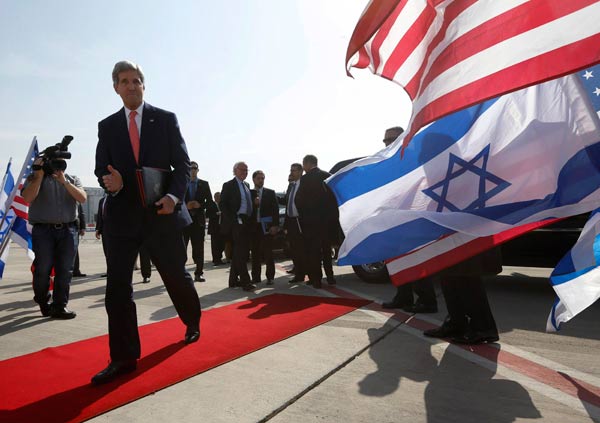

The Geneva talks between Iran and the five permanent members of the United Nations Security Council plus Germany, known as the P5+1, ended Sunday without a deal.
After nearly a decade of mostly inconclusive bargaining, any breakthrough would have been welcomed by all, and one seemed to be on the cards in the run-up to these talks.

US Secretary of State John Kerry walks to his plane after a private meeting with Israeli Prime Minister Benjamin Netanyahu in Tel Aviv November 8, 2013. [Photo / Agencies]
Before the diplomats sat down in Geneva to negotiate, we heard an optimistic Washington say a deal was "possible" this time. On Saturday, Iranian President Hassan Rouhani urged world powers not to miss the "exceptional opportunity", and the same day, British Foreign Secretary William Hague pledged to "seize the moment".
And with the British Foreign Secretary reporting "good progress", US Secretary of State John Kerry seeing "significant progress", and top European Union diplomat Catherine Ashton speaking of "a lot of concrete progress", the possibility of a deal being reached appeared unusually promising.
The fruitless ending to the talks, therefore, is disappointing.
However, looking on the bright side, the fine atmosphere established for the talks represent a precious step forward in the collective endeavor to defuse the longstanding impasse.
The talks were "based on mutual respect and equal footing", as Iranian Foreign Minister Mohammad Javad Zarif put it. And the British Foreign Secretary acknowledged that "the atmosphere is completely different", and that a "wide number of issues have been satisfactorily addressed".
That the latest negotiations ended with no deal signed shows a quick resolution to the decade-long stalemate was unrealistic. But the positive messages coming out of the talks are surely conducive to substantial diplomatic progress in the near future if the good momentum can be maintained.
The last-minute objection by the French to a draft deal they had previously agreed to, as well as French Foreign Minister Laurent Fabius' statement that his nation does not want to be part of a "sucker's deal" and a "con game" brought into the spotlight the magnitude of the mistrust that has to be overcome.
Yet, contrary to French Foreign Ministry spokesman Romain Nadal's appeal for "a serious change in the climate" of the talks, the No.1 imperative now is to nurture the goodwill between the two sides at the new round of talks scheduled for November 20.
An agreement between Iran and the International Atomic Energy Agency, which Iran says includes "concrete actions" and is due to be finalized Monday, would be a positive signal that hopes can remain high.
(China Daily 11/11/2013 page8)